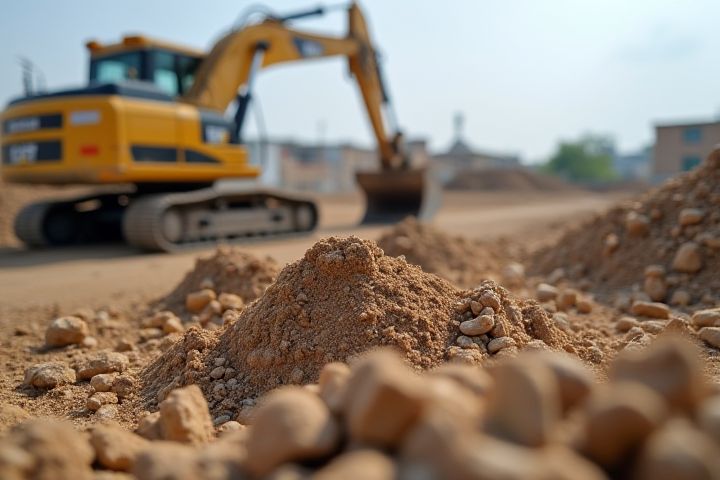
Construction in Nigeria is a rapidly evolving sector, driven by urbanization and infrastructure development. The government is investing heavily in road, rail, and housing projects to support economic growth and attract foreign investment. Major cities like Lagos and Abuja are witnessing a surge in skyscrapers and residential complexes, reflecting modern architectural trends and sustainable practices. Local firms are increasingly collaborating with international contractors to enhance expertise and technology transfer. You can explore opportunities in this booming market by understanding regional regulations and aligning with local standards.
Regulatory Framework
The regulatory framework in Nigeria's construction industry plays a pivotal role in ensuring safety, quality, and compliance with building standards. Key entities, such as the Nigerian Building and Road Research Institute (NBRRI) and the Council for the Regulation of Engineering in Nigeria (COREN), establish guidelines that govern project execution. Adhering to these regulations helps mitigate risks associated with construction hazards and promotes sustainable development practices. By understanding and navigating the regulatory landscape, you can enhance project efficiency and contribute to the nation's infrastructure growth.
Diverse Infrastructure Needs
Nigeria's construction sector is experiencing significant growth, driven by diverse infrastructure needs including roads, bridges, and housing developments. The government has prioritized expanding urban infrastructure to accommodate the nation's rapidly increasing population, which is projected to reach 400 million by 2050. Innovative building materials and sustainable practices are gaining traction, enhancing efficiency and environmental sustainability in projects. By investing in modern infrastructure, Nigeria aims to stimulate economic growth and improve living conditions for its citizens.
Skilled Labor Shortage
The construction industry in Nigeria faces a significant skilled labor shortage, impacting project timelines and quality. As demand for infrastructure and housing surges, the gap between required competencies and available skilled workers widens, resulting in a reliance on unskilled labor. Training programs and vocational education are essential to develop a skilled workforce that meets the industry's needs. By investing in human capital, stakeholders can enhance productivity and ensure sustainable growth in the construction sector.
Raw Material Availability
The construction industry in Nigeria heavily relies on the availability of raw materials such as cement, sand, and granite, which are essential for building infrastructure. Local sourcing of these materials significantly reduces costs and transportation time, enhancing the overall efficiency of construction projects. The strategic development of quarries and manufacturing plants promotes sustainable practices and supports economic growth within the region. You can benefit from understanding the importance of sourcing materials locally to contribute to the development of Nigeria's construction sector.
Urbanization Trends
Nigeria's construction sector is increasingly shaped by rapid urbanization trends, with cities like Lagos and Abuja witnessing significant infrastructure development. The demand for residential, commercial, and transportation projects is driven by a growing population and a shift towards sustainable urban living. Key initiatives include the construction of smart urban spaces and affordable housing to accommodate the urban influx. Your investment in this sector aligns with the nation's efforts to improve living standards and support economic growth.
Foreign Investment
Nigeria's construction sector is increasingly attracting foreign investment, driven by the country's vast infrastructure needs and economic growth potential. Multinational corporations are capitalizing on opportunities in areas such as road, rail, and housing development, leveraging advanced technology and project management expertise. You can witness significant investments from countries like China, which has undertaken major projects, including the Abuja-Kaduna Railway and various urban housing initiatives. This influx of foreign capital not only boosts Nigeria's economic landscape but also enhances job creation and skills transfer within the local workforce.
Technological Adoption
Construction in Nigeria is increasingly embracing technological adoption to enhance efficiency and project management. Innovations such as Building Information Modeling (BIM) and drone surveying are becoming essential tools for architects and contractors, streamlining workflows and improving accuracy. Advanced materials, including sustainable alternatives, are gaining traction, contributing to both environmental preservation and cost-effectiveness. By integrating these technologies, your construction projects can achieve higher standards of quality and safety while reducing operational delays.
Environmental Concerns
The construction industry in Nigeria has increasingly prioritized environmental sustainability amid rapid urbanization and infrastructure development. Key initiatives include the adoption of eco-friendly building materials, energy-efficient designs, and waste reduction strategies to minimize carbon footprints. Regulatory frameworks, such as the National Environmental (Sanitation and Wastes Control) Regulation, enforce compliance with environmental standards to protect natural resources. As a result, construction projects now aim to balance economic growth with ecological preservation, fostering a greener future for urban landscapes.
Project Financing
Project financing in Nigeria is a pivotal component of the construction sector, facilitating large-scale infrastructure developments. This financial model enables developers to secure funding through equity and debt without putting their balance sheets at risk, thereby attracting both local and international investors. Key projects often funded through this method include roads, bridges, and real estate developments, which contribute significantly to economic growth. Understanding the intricacies of project financing can empower you to navigate potential investment opportunities effectively.
Cultural Considerations
Construction in Nigeria increasingly emphasizes cultural considerations, reflecting the nation's rich heritage and diverse ethnic practices. Builders are integrating traditional architectural styles with modern design techniques, creating structures that resonate with local cultural identity. This approach not only preserves historical significance but also enhances community engagement and pride among inhabitants. By prioritizing cultural sensitivity, your projects can foster a harmonious relationship between contemporary developments and Nigeria's vibrant traditions.
